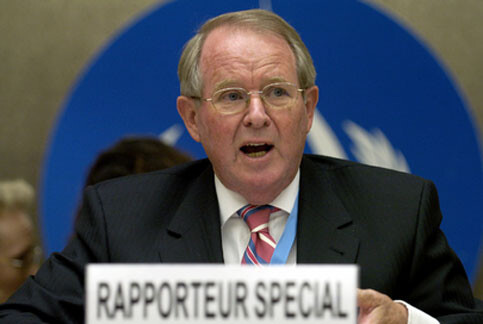United Nations News Service 27 March 2007

John Dugard, Special Rapporteur on the situation of human rights in the Occupied Palestinian Territories presents a report to the fourth session of the United Nations Human Rights Council in Geneva, Switzerland. (UN Photo/Jean-Marc Ferré)
The United Nations Human Rights Council today adopted a resolution without a vote which called for two urgent fact-finding missions to be dispatched to the occupied Palestinian territory, voicing concern that previous attempts to investigate potential human rights abuses had been hindered by Israel.
The 47-member Council noted with regret that Israel had not cooperated with two previous resolutions which dispatched the missions.
A resolution in July said Israel must “end its military operations in the occupied Palestinian territory, abide scrupulously by the provisions of international humanitarian law and human rights law, and refrain from imposing collective punishment on Palestinian civilians,” while a November resolution called for the “immediate protection of the Palestinian civilians in the occupied Palestinian territory in compliance with human rights law and international humanitarian law.”
John Dugard, the Special Rapporteur on the situation of human rights in the Palestinian territories occupied since 1967, reported that he had not been able to carry out his survey called for by a Council resolution last July, due to the Israeli Government’s lack of consent.
A November Council resolution dispatched a mission to Beit Hanoun in the northern Gaza Strip where an Israeli attack killed 19 Palestinian civilians earlier that month. However, a team lead by Nobel Peace Prize laureate Desmond Tutu was thwarted from carrying out its task in December. The Council today also requested that the body’s president and the UN High Commissioner for Human Rights Louise Arbour report to the Council at its next session, slated for June, on Israel’s compliance with its resolutions of last July and November.
Speaking as a concerned country, Israel said last year’s Council resolutions were prominent examples of selectivity, politicization and double standards because the language used was narrow, restrictive and very precisely delineated.
Another resolution passed today was on procedural issues, including the timing of the submission of progress reports.
The Council also heard reports from Special Rapporteurs, who are unpaid experts serving in an independent personal capacity.
In his report, Philip Alston, the Special Rapporteur on extrajudicial, summary or arbitrary executions, said that with respect to the idea of “mercy killings,” international humanitarian law prohibits the killing of those who have laid down their arms or have been disabled.
In another report, Doudou Diene, the Special Rapporteur on contemporary forms of racism, racial discrimination, xenophobia and related intolerance, said that there are worrying trends, including the resurgence of racism, racial discrimination and xenophobia. He called for a dual strategy — political and legal on the one hand, and cultural and ethical on the other — to identify the root causes and reverse these trends.
The Council, currently in its fourth session which will conclude on Friday, was created last year to replace the Commission on Human Rights which had been criticized for ignoring abuses in many countries.
Tomorrow, the Council will hear reports on human rights and transnational corporations, the right to health and human rights defenders.
Related Links